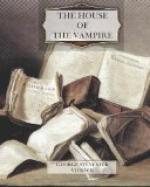But to Ethel his words carried no conviction.
“You are still under his spell,” she cried, anxiously.
A little shaken in his confidence, Ernest resumed: “Reginald is utterly incapable of such an action, even granting that he possessed the terrible power of which you speak. A man of his splendid resources, a literary Midas at whose very touch every word turns into gold, is under no necessity to prey on the thoughts of others. Circumstances, I admit, are suspicious. But in the light of common day this fanciful theory shrivels into nothing. Any court of law would reject our evidence as madness. It is too utterly fantastic, utterly alien to any human experience.”
“Is it though?” Ethel replied with peculiar intonation.
“Why, what do you mean?”
“Surely,” she answered, “you must know that in the legends of every nation we read of men and women who were called vampires. They are beings, not always wholly evil, whom every night some mysterious impulse leads to steal into unguarded bedchambers, to suck the blood of the sleepers and then, having waxed strong on the life of their victims, cautiously to retreat. Thence comes it that their lips are very red. It is even said that they can find no rest in the grave, but return to their former haunts long after they are believed to be dead. Those whom they visit, however, pine away for no apparent reason. The physicians shake their wise heads and speak of consumption. But sometimes, ancient chronicles assure us, the people’s suspicions were aroused, and under the leadership of a good priest they went in solemn procession to the graves of the persons suspected. And on opening the tombs it was found that their coffins had rotted away and the flowers in their hair were black. But their bodies were white and whole; through no empty sockets crept the vermin, and their sucking lips were still moist with a little blood.”
Ernest was carried away in spite of himself by her account, which vividly resembled his own experience. Still he would not give in.
“All this is impressive. I admit it is very impressive. But you yourself speak of such stories as legends. They are unfounded upon any tangible fact, and you cannot expect a man schooled in modern sciences to admit, as having any possible bearing upon his life, the crude belief of the Middle Ages!”
“Why not?” she responded. “Our scientists have proved true the wildest theories of mediaeval scholars. The transmutation of metals seems to-day no longer an idle speculation, and radium has transformed into potential reality the dream of perpetual motion. The fundamental notions of mathematics are being undermined. One school of philosophers claims that the number of angles in a triangle is equal to more than two right angles; another propounds that it is less. Even great scientists who have studied the soul of nature are turning to spiritism. The world is overcoming the shallow scepticism of the nineteenth century. Life has become once more wonderful and very mysterious. But it also seems that, with the miracles of the old days, their terrors, their nightmares and their monsters have come back in a modern guise.”




